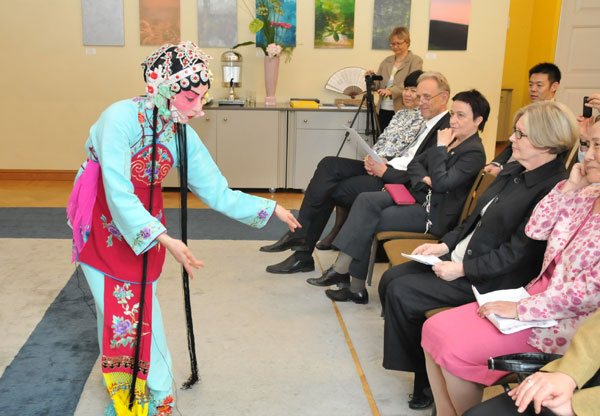Chinese classes in the UK need more teachers
Updated: 2013-02-08 09:00
By Cecily Liu (China Daily)
|
|||||||||||
 |
|
A student at the Confucius Institute at the University of Helsinki in Finland performs Peking Opera at the fifth anniversary of the institute on May 31. Zhao Changchun / Xinhua |
Chao says that British secondary schools are sometimes reluctant to set up Mandarin curriculum classes due to an inconsistent supply of Mandarin teachers.
Because there are very few local Mandarin teachers, many UK Mandarin classrooms are taught by teachers sent from China by Hanban.
As some of Hanban's teachers are volunteers, their visas allows them to stay in the UK for only one year. Secondary schools are reluctant to assign them to curriculum classes, as there is a fear that a class may go without a teacher when the volunteer returns to China. "In any case, frequently changing teachers is not good for the consistency of students' learning," Chao said.
However, it is encouraging to observe that opportunities for Mandarin teachers to receive training in the UK has been increasing in recent years, said Tang Yunyun, a Mandarin teacher at Wellington College, a UK secondary school.
A permanent resident in the UK, Tang received her Mandarin teacher qualification from Goldsmith College, University of London, and subsequently became a Mandarin teacher at Wellington College six years ago.
More recently, Sheffield University and the Institute of Education in London have both started offering Mandarin teaching training courses, Tang said.
With Tang's help, Wellington College started offering Mandarin for curriculum classes, including GCSE, A-level and International Baccalaureate. She was later joined by another local Mandarin teacher and a temporary Mandarin teacher from Hanban.
There are 104 students taking Mandarin at Wellington College, or about 10 percent of the school's entire student population.
As a sign of dedication to Mandarin learning, Wellington College last year became the first British school to open a Mandarin center. Consisting of two classrooms in a pagoda-inspired building with an external water garden enclosed by Chinese wooden fences, the center cost 500,000 pounds ($782,950).
"It's not just the language. It's about understanding the Chinese way of approaching life," Anthony Seldon, headmaster of the college, told China Daily in an interview last June. To set an example to his pupils, Seldon also started learning Mandarin. Unfortunately, there are few schools in the UK dedicated teaching Mandarin in the same way Wellington College does.
Colin Pyle, of Mandarin House Chinese Schools, an international organization focusing on teaching Mandarin to professionals, says learning Mandarin should be made a priority by the UK government in order to grow the link between China and UK.
"In China the majority of schools across the country teach English, this will cause an imbalance for future generations" Pyle said.
"The primary school students are too young to realize the opportunities offered by learning Mandarin, so their parents should drive them to choose Mandarin and realize the opportunities. At the same time, organizations like the British Council should also do more to make the parents understand these opportunities," he said.
cecily.liu@chinadaily.com.cn
Related Stories
Talking up Mandarin a global undertaking 2013-01-02 07:51
Hanban sets guidelines for Mandarin teachers 2012-12-13 09:06
China salvages local dialects as Mandarin prevails 2012-09-06 14:34
Fiji to introduce Mandarin classes 2012-07-11 16:36
Teaching Mandarin through music 2012-07-02 14:29
Today's Top News
Police continue manhunt for 2nd bombing suspect
H7N9 flu transmission studied
8% growth predicted for Q2
Nuke reactor gets foreign contract
First couple on Time's list of most influential
'Green' awareness levels drop in Beijing
Palace Museum spruces up
Trading channels 'need to broaden'
Hot Topics
Lunar probe , China growth forecasts, Emission rules get tougher, China seen through 'colored lens', International board,
Editor's Picks

|

|

|

|

|

|





